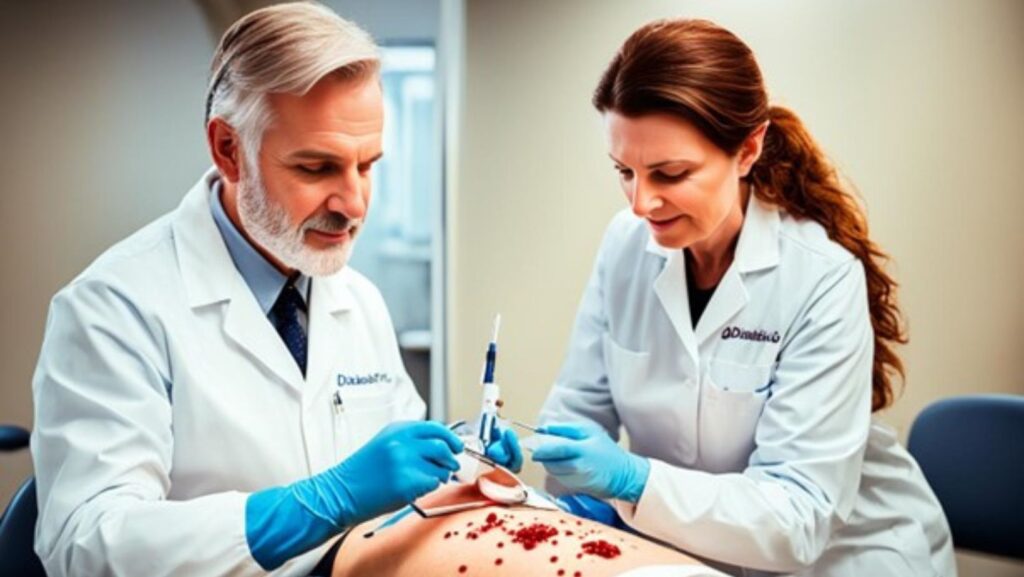If you have diabetes, it’s key to work with a skilled diabetic wound care specialist. They know how to handle and heal your diabetic wounds. They also give advice on managing diabetes. When you talk to your specialist, ask the right questions to get the best care and results.
Talking to your diabetic wound care specialist and asking important questions helps you take charge of your health. This way, you can create a care plan that fits your needs. This approach can improve wound healing, diabetes management, and your overall quality of life.
Understanding the Role of a Diabetic Wound Care Specialist
Having a diabetic wound care specialist on your healthcare team is key for managing diabetic wounds. They bring special skills and knowledge vital for tackling the complex issues diabetes brings. This expertise is crucial for those with diabetes.
Expertise in Wound Healing
Diabetic wound care specialists know a lot about how wound healing works. They understand the complex steps of healing and what can slow it down for people with diabetes. They watch the wound closely to make sure it heals well.
Comprehensive Diabetes Management
These specialists are also experts in diabetes management. They know how diabetes affects wound healing.

So, they focus on the wound and the patient’s overall care plan for diabetes.
They work with doctors and nutritionists to make sure the patient’s diabetes management is top-notch. This helps the wound heal better and lowers the chance of future problems.
Essential Inquiries for Optimal Care
Dealing with diabetic wound care can seem tough. However, asking the right questions helps patients get the care they need. Talking with a diabetic wound care specialist is key. It helps patients understand the treatment options and how to prevent problems.
Here are some important questions to ask:
- What is the specific nature and stage of my diabetic wound, and how will it impact my overall health?
- What are the recommended treatment options, and what are the potential benefits and risks associated with each approach?
- How can I best manage my diabetes to promote faster wound healing and prevent future complications?
- What lifestyle modifications or preventive strategies can I implement to minimize the risk of developing new wounds or recurring issues?
- How often should I schedule follow-up appointments with the specialist to ensure my care plan remains effective?
Asking these questions helps patients and their specialists create a care plan that fits their needs. It lets patients take an active part in their recovery and health.
Exploring Treatment Options and Prevention Strategies
Dealing with diabetic wounds requires expert care. A skilled wound care specialist is key.

They create detailed treatment plans for diabetes-related skin and tissue issues.
Wound Dressings and Medications
A diabetic wound care specialist picks the right wound dressings and medications for healing. They use advanced products like hydrogels and antimicrobial dressings. These create the best conditions for healing tissues.
They might also suggest topical or systemic medications. These help fight infection, reduce inflammation, and speed up healing.
Lifestyle Modifications for Better Outcomes
Specialists also focus on lifestyle changes for healing and preventing future issues. They teach proper wound care, suggest diet changes, and encourage exercise. This helps manage blood sugar and boosts overall health.
By working with patients, these specialists empower them to manage their wounds and stay healthy.
